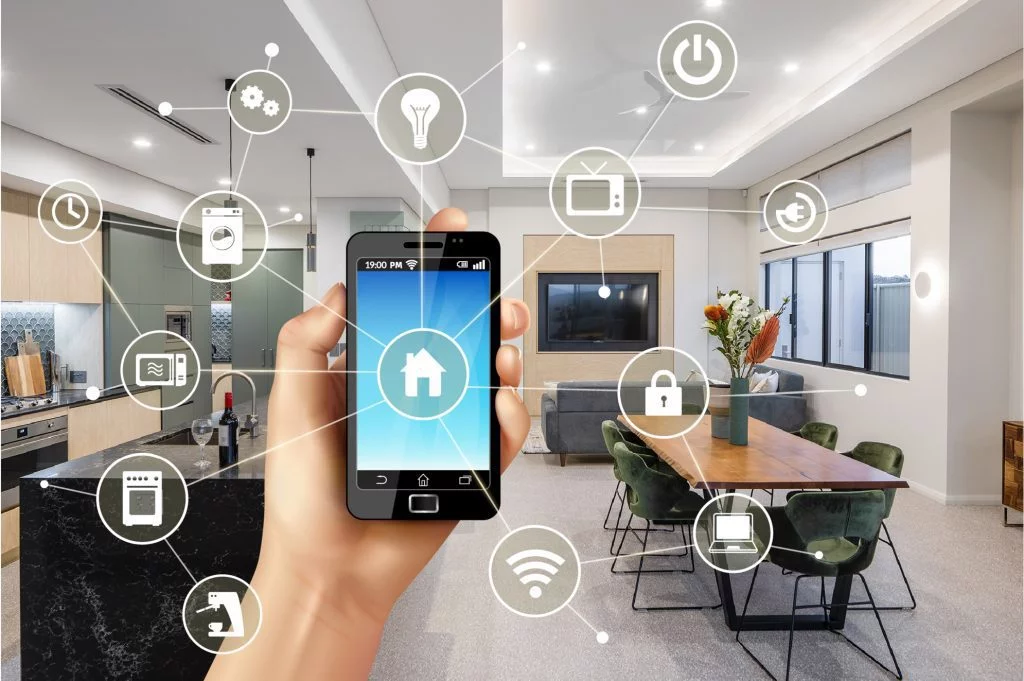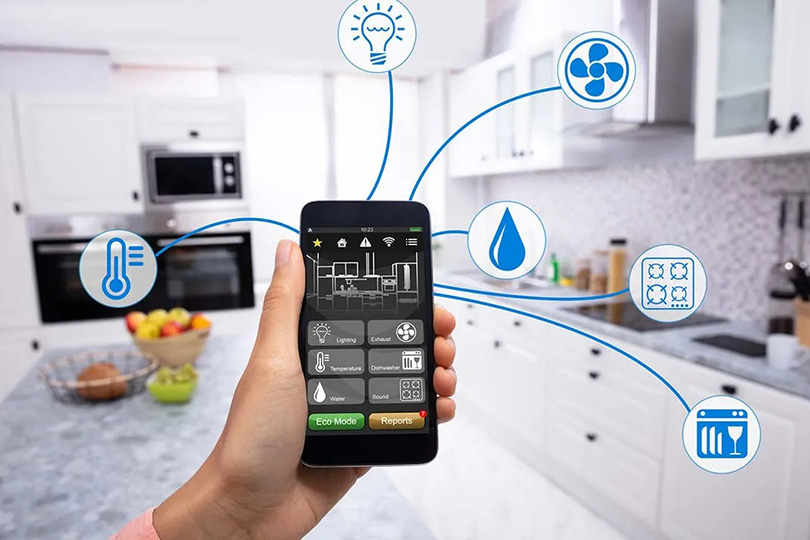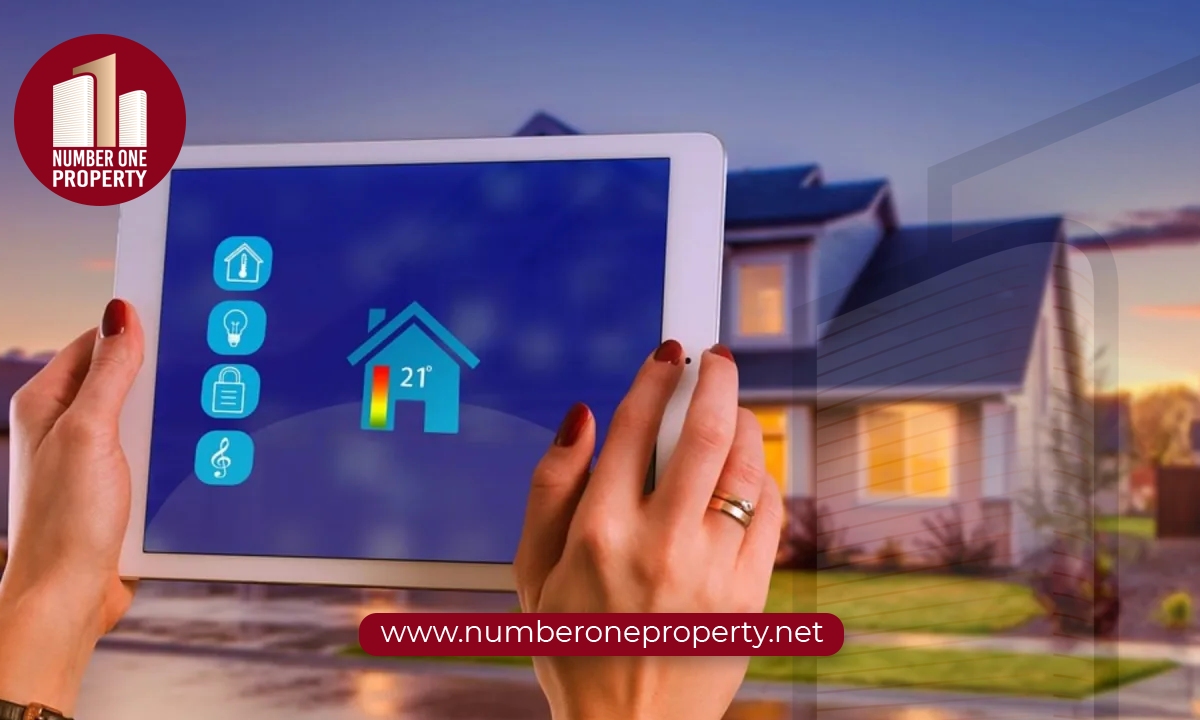In recent years, the real estate sector has witnessed a remarkable digital transformation, which is reshaping how properties are bought, sold, and managed.
This shift towards digitalization has been propelled by technological advances and changing consumer expectations, leading to more efficient, transparent, and user-friendly real estate transactions.
Today, integrating digital tools and platforms into real estate processes is not just a convenience but a necessity.
These solutions offer unparalleled access to market data, virtual property tours, and streamlined online transactions.
These digital solutions have democratized real estate investments, making it easier for buyers and sellers worldwide to connect and engage in property transactions in the real estate business.
Parallel to the digital evolution of the real estate sector is the rise of smart homes, which have become an increasingly significant aspect of modern real estate.
Smart homes, characterized by integrating Internet of Things (IoT) devices and automation systems, offer homeowners unprecedented control over their living environments.
From security systems that can be monitored remotely to thermostats that learn a homeowner's preferences, smart homes are designed to enhance convenience, comfort, and energy efficiency.
These intelligent homes cater to the growing demand for connected living solutions and add significant value to properties, making them more attractive to tech-savvy buyers.

The growing significance of smart homes in the real estate market cannot be understated.
As consumers become more accustomed to the convenience and efficiency offered by technology in their daily lives, they expect intelligent features in their homes.
This demand drives innovation in the real estate sector, encouraging developers and builders to incorporate innovative technologies into new constructions and renovations.
Moreover, automating and remotely controlling home environments appeals to a broad spectrum of buyers, from millennials seeking the latest tech conveniences to older generations looking for security and energy-saving solutions.
As we navigate this digital age, integrating advanced technologies in real estate and the proliferation of smart homes redefine our concepts of living spaces, property value, and the home-buying process.
The future of real estate, characterized by digital platforms and smart home technologies, promises enhanced efficiency, security, and comfort, heralding a new era in how we live and interact with our homes.
The Evolution of Real Estate in the Digital Age
The evolution of real estate in the digital age is a fascinating journey from traditional, in-person transactions to the highly digitalized process we see today.
This transition began with the advent of the Internet, drastically changing how properties were marketed, viewed, and sold. Initially, real estate listings moved from newspaper classifieds to online platforms, significantly widening the potential audience for property sales and rentals.
This began a digital revolution encompassing every aspect of real estate transactions and related smart technologies.
The Impact of Digital Platforms
The impact of digital platforms on the real estate industry goes beyond just providing a convenient way for users to browse listings; Zillow and Realtor have become household names, allowing users to browse properties from the comfort of their homes.
These platforms have fundamentally changed the way properties are marketed and sold. Real estate agents and property developers now have access to a much larger audience, reaching potential buyers and tenants worldwide.
One key benefit of digital platforms is the ability to provide detailed information about properties. Users can view floor plans, property dimensions, amenities, and neighborhood statistics with just a few clicks.
This level of transparency helps to build trust between buyers and sellers, leading to more successful transactions.
Furthermore, the rise of social media and online advertising has allowed real estate professionals to target specific demographics with their listings.
This targeted approach can lead to faster sales and higher prices for properties, as they are being marketed to individuals most likely to be interested in them.
Overall, these platforms have revolutionized the industry, making it easier for buyers, sellers, and agents to connect and transact more efficiently and transparently.
Artificial Intelligence (AI)
Artificial intelligence (AI) revolutionizes the real estate industry by providing agents with powerful tools to streamline operations, improve customer service, and make data-driven decisions.
One critical application of AI in real estate technology is predictive analytics. By analyzing historical data and market trends, AI algorithms can forecast property values, rental rates, and demand for specific locations.
This enables real estate professionals to identify lucrative investment opportunities and make informed pricing, marketing strategies, and property management decisions.
AI-powered chatbots are another valuable tool for real estate agents. They can automate customer interactions, answer common queries, and provide potential buyers or renters with personalized recommendations.
Chatbots can engage with clients 24/7, improving response times and enhancing the overall customer experience.
Additionally, AI-driven virtual assistants can help real estate agents manage their schedules, organize appointments, and prioritize tasks, freeing up time for more strategic activities.
In property search and recommendation, AI algorithms can analyze vast amounts of data to generate personalized property listings based on a client's preferences, budget, location, and other criteria.
This saves agents and clients time and increases the likelihood of finding the perfect match between a buyer or renter and a property. AI can also assist in identifying potential leads, analyzing market trends, and optimizing marketing campaigns to target specific audiences effectively.
Integrating AI technologies in real estate transforms the industry by empowering agents with advanced tools to enhance efficiency, improve decision-making, and deliver superior customer experiences.
As AI evolves and becomes more sophisticated, real estate professionals who embrace these technologies will have a competitive edge in an increasingly digital marketplace.
Social Media in Marketing
The role of social media in marketing properties has also been a game-changer. Real estate agents, companies, and individual sellers now leverage social media platforms to showcase properties, reach a wider audience, and build brand awareness.
Real estate professionals can more effectively and personally engage with potential clients through platforms like Instagram, Facebook, and X by sharing property photos, success stories, and customer testimonials.
Social media facilitates direct communication between sellers and buyers and allows targeted advertising, reaching specific demographics based on interests, location, and more.
The digital transformation of real estate transactions and property management has increased efficiency, accessibility, and transparency in buying and selling.
Online platforms and digital tools provide buyers with the information they need to make informed decisions, from property details and pricing to neighborhood data and market trends.
The Rise of Smart Homes

Smart homes are residences with interconnected devices and systems that can be controlled remotely for convenience, security, energy efficiency, and comfort.
Components include smart thermostats, lighting systems, security systems, appliances, voice assistants, automated blinds, and irrigation systems.
They offer residents control over their environment, energy savings, security, and automation.
Smart homes are revolutionizing the real estate industry, with real estate agents and professionals leveraging cutting-edge real estate technology to enhance properties and attract buyers.
These technologically advanced residences are equipped with interconnected devices and systems that can be controlled remotely, offering unparalleled convenience, security, and energy efficiency.
Key features of smart homes include smart thermostats that adjust temperature settings based on occupants' preferences. These intelligent lighting systems can be customized to create the perfect ambiance, and state-of-the-art security cameras provide round-the-clock surveillance.
Real estate agents are increasingly incorporating smart home technology into their listings to showcase the innovative features of these properties and appeal to tech-savvy buyers in real estate businesses.
Real estate professionals can differentiate their listings in a competitive market by highlighting the benefits of smart homes, such as energy savings, increased security, and seamless automation.
With the evolution of real estate technology, traditional homes are being transformed into intelligent ecosystems that adapt to residents' needs and preferences.
The global smart home market is experiencing rapid growth, driven by advancements in connectivity and the integration of voice assistants like Amazon Alexa and Google Assistant.
Real estate professionals are at the forefront of this trend, embracing smart home technology to offer clients a more efficient and personalized living experience.
As smart homes become an integral part of modern real estate practices, real estate professionals are adapting to meet the demands of tech-savvy buyers who value convenience, security, and energy efficiency in their homes.
The integration of smart home technology is shaping the future of the real estate industry, paving the way for a new era of intelligent living spaces.
The Benefits of Smart Homes
Smart homes have become increasingly popular in the real estate industry due to their integration of technology and automation.
Real estate development incorporates smart home features into new construction projects to attract buyers who value convenience and modern living.
Virtual reality technology is also being used to showcase smart home features to potential buyers, allowing them to virtually tour a property and experience the benefits of automation firsthand.
In commercial real estate, intelligent building technology revolutionizes how properties are managed and operated.
Property technology (prop-tech) solutions are implemented to improve energy efficiency, optimize space utilization, and enhance tenant experiences.
Intelligent building features such as automated lighting and HVAC systems can help reduce operating costs and attract tenants looking for sustainable and efficient spaces.
One of the key benefits of smart homes in real estate is their impact on property value and marketability.
Homes with intelligent features are often perceived as more valuable and desirable, leading to higher resale prices and faster sales.
Buyers are willing to pay a premium for properties with smart home technology due to the convenience, comfort, and energy savings they offer.
As the demand for smart homes continues to grow, properties with these features are expected to have a competitive edge in the real estate market.
Technologies Shaping Smart Homes

The intersection of virtual and augmented reality with big data analytics is revolutionizing how we experience and interact with smart homes in real estate companies.
Virtual tours powered by AR and VR technology provide potential buyers with immersive experiences, allowing them to explore properties remotely and visualize home modifications in real time.
Machine learning algorithms are crucial in personalizing home automation solutions based on residents' preferences and behaviors, enhancing convenience and efficiency.
Intelligent buildings with proptech solutions leverage big data analytics in commercial real estate to optimize energy efficiency, space utilization, and tenant experiences.
These technologies are reshaping the real estate industry by offering innovative solutions that enhance sustainability, comfort, and convenience for homeowners and property managers alike.
Integrating IoT devices further enhances connectivity within smart homes, enabling seamless communication between various home devices and systems.
Artificial intelligence in home automation adds a layer of intelligence and automation, making smart homes more intuitive and responsive to residents' needs.
Overall, the convergence of virtual and augmented reality, artificial intelligence, big data analytics, machine learning, and IoT technologies is shaping the future of smart homes and revolutionizing how we live and interact with our living spaces.
The Digitalization of Real Estate Transactions
Digitalizing real estate transactions has significantly transformed the property management landscape, leveraging real estate technology and property technology to streamline processes and enhance user experiences.
Online property listings and virtual tours have revolutionized how properties are marketed and viewed, allowing potential buyers to explore homes remotely with immersive virtual experiences.
Blockchain technology has brought transparency and security to property transactions, ensuring trust and efficiency in real estate deals.
The emergence of online real estate marketplaces and platforms has simplified properties' buying, selling, and renting, offering a seamless and convenient experience for buyers and sellers.
Overall, integrating digital tools in property management has reshaped the industry, making transactions more efficient, transparent, and user-friendly, driving innovation and modernization in real estate practices.
Challenges and Considerations
One of the critical challenges in real estate technology is privacy and security, particularly regarding smart home technologies.
With the increasing use of internet-connected devices in real estate technology, there is a growing concern about the potential vulnerabilities that could expose sensitive information to cyber threats.
Additionally, the digital divide poses a significant challenge in adopting new real estate technology, as not all individuals or communities have equal access to digital tools and resources.
This can create disparities in the real estate technology market and limit the benefits of technology for some stakeholders.
Furthermore, legal and regulatory challenges in the digital real estate technology market, such as data protection laws and compliance requirements, can pose obstacles to the widespread adoption of technology in the real estate industry.
Addressing these challenges and considerations is crucial for ensuring real estate technology's responsible and effective integration into the commercial real estate market.
Smart Homes and Sustainability
Real estate technology has revolutionized how property owners and developers approach sustainability in real estate businesses.
Smart homes are crucial in promoting sustainable living practices by integrating energy-efficient systems and renewable energy sources into their designs.
Property owners increasingly invest in innovative water and waste management systems to conserve resources and reduce environmental impact.
These advancements benefit the environment and enhance the value of real estate assets.
Real estate technology has enabled property management companies to monitor and optimize real-time energy consumption, water usage, and waste disposal, leading to more sustainable and cost-effective operations.
By incorporating these sustainable practices into real estate development, property owners can contribute to a greener future while maximizing the potential of their real estate assets.
The Future of Real Estate and Smart Homes

The future of real estate and smart homes is poised for significant technological advancements, with predictions pointing towards integrating artificial intelligence, virtual reality, and Internet of Things (IoT) devices into property management systems.
These innovations will revolutionize the real estate industry's operations, enhancing efficiency, sustainability, and user experience.
As smart cities continue to evolve, smart homes will play a crucial role in integrating into larger ecosystems by connecting with public infrastructure and services to create more sustainable and interconnected communities.
However, challenges remain in making smart homes accessible and affordable for a broader range of consumers.
Property managers and real estate businesses must navigate these challenges by leveraging property technology solutions to streamline operations and make smart home features more cost-effective and user-friendly.
These advancements benefit the commercial real estate sector significantly. Property managers can optimize building performance, reduce operating costs, and enhance tenant satisfaction by adopting real estate technology and smart home solutions.
Conclusion
The transformative potential of digitalization and intelligent technology in real estate is reshaping the landscape of residential space and property management.
With the ongoing convergence of technology and real estate, the industry is experiencing a shift towards more efficient and sustainable practices driven by smart devices and modern technologies.
Property owners, real estate companies, and investors can now leverage digital tools to manage properties, analyze property data, and enhance the overall value of real estate assets.
Virtual reality is revolutionizing the way property buyers search for their ideal homes. It allows them to explore properties remotely and experience immersive virtual tours.
This digital business approach streamlines real estate development processes and improves the overall customer experience in the real estate business.
As we move forward in the digital age, the outlook for potential homeowners and investors is promising, with increased access to information, personalized search criteria, and innovative solutions shaping the future of real estate.
Related Articles:
Investing in Green Buildings and Eco-Friendly Real Estate Developments


